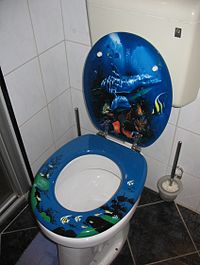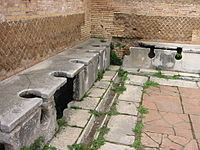toilet
English
[edit]Alternative forms
[edit]- toilette (certain senses only)
Etymology
[edit]From Middle French toilette (“small cloth”), diminutive of toile (“cloth”), from their use to protect clothing while shaving or arranging hair. From its use as a private room, toilet came to refer euphemistically to lavatories and then to its fixtures, beginning in the United States in the late 19th century.[1]
Pronunciation
[edit]Noun
[edit]toilet (plural toilets)
- (UK, Australia, Hong Kong) A room or enclosed area containing a fixture used for urination and defecation (i.e. a toilet (sense 2)): a bathroom or water closet. [from 19th c.]
- Sorry, I was in the toilet.
- 2002, Digby Tantam, Psychotherapy and Counselling in Practice: A Narrative Framework, page 122:
- He would hit her when she cried and, if this did not work, would lock her in the toilet for hours on end.
- 2014, C.S. Walter, Abandoned Bridges, pp. 105 f.:
- A fixture used for urination and defecation, particularly one with a large bowl and ring-shaped seat which uses water to flush the waste material into a septic tank or sewer system. [from 19th c.]
- My toilet backed up. Now the bathroom's flooded.
- (figuratively) A very shabby or dirty place. [from 20th c.]
- 1982, The Mosquito Coast:
- Look around you. It's a toilet.
- 1991, Stephen King, Needful Things:
- Mr. Gaunt was urbane and smiling again, not a hair out of place. "Do you like this little town? Do you love it? […] "
[…]
"I hate this fucking toilet," he said to Leland Gaunt.
- (New Zealand) A small secondary lavatory having a fixture used for urination and defecation (i.e. a toilet (sense 2)) and sink but no bathtub or shower.
- (obsolete) A covering of linen, silk, or tapestry, spread over a dressing table in a chamber or dressing room. [17th–19th c.]
- (obsolete) The table covered by such a cloth; a dressing table. [17th–19th c.]
- 1714, Alexander Pope, The Rape of the Lock, Canto I, lines 121-126:
- And now, unveil’d, the toilet stands display’d,
Each silver vase in mystic order laid.
- (now historical or archaic) Personal grooming; the process of washing, dressing and arranging the hair. [from 17th c.]
- 1791, Elizabeth Inchbald, A Simple Story, Oxford, published 2009, page 118:
- Against that short evening her toilet was consulted the whole day […] .
- 1913, Rabindranath Tagore, Come as you are..., Poetry Foundation, page 85:
- Come as you are, tarry not over your toilet.
- 1931, William Faulkner, Sanctuary, Vintage, published 1993, page 111:
- Three women got down and standing on the curb they made unabashed toilets, smoothing skirts and stockings, brushing one another's back, opening parcels and donning various finery.
- 1952, Norman Lewis, Golden Earth, Chapter 8:
- Here, at night, a lonely but brilliantly neon-illuminated figure, I performed my toilet, watched incuriously by the Burmese seated at the tables of the tea-shops below.
- (now rare, archaic) One's style of dressing: dress, outfit. [from 18th c.]
- 1871, George Eliot [pseudonym; Mary Ann Evans], chapter I, in Middlemarch […], volume I, Edinburgh, London: William Blackwood and Sons, →OCLC, book I, page 25:
- It is so painful in you, Celia, that you will look at human beings as if they were merely animals with a toilette, and never see the great soul in a man's face.
- 1917, Arthur Conan Doyle, The Adventure of Wisteria Lodge:
- "It is a quarter-past two," he said. "Your telegram was dispatched about one. But no one can glance at your toilet and attire without seeing that your disturbance dates from the moment of your waking."
- (archaic) A dressing room. [from 19th c.]
- (obsolete) A chamber pot.
Usage notes
[edit]- In the United States and Canada, toilet refers most directly to fixtures for containing or removing human waste. As such, although toilet was originally a euphemism itself, its use to describe the place where the toilets are located (e.g., "Where is the toilet?") is now considered somewhat indiscreet; instead, it is more common to employ other euphemisms such as bathroom, restroom, or WC. Until the late 19th century, toilet referred solely to personal grooming, including bathing and hair care. This still appears in toiletries and in various set phrases, such as toilet water and toilet bag. This use is sometimes understood as a new borrowing from French, despite being the older sense of the English word. Medical jargon also includes some set phrases such as pulmonary toilet and toilet of the mouth; in both cases the word toilet means general hygiene.
Synonyms
[edit]- (room for urination and defecation): See Thesaurus:bathroom
- (small secondary room for urination and defecation): half bath, half bathroom (US); cloakroom (UK)
- (pot used for urination and defecation): Thesaurus:chamber pot
- (fixture for urination and defecation): See Thesaurus:toilet
- (in a nautical context): See head (item 4.1.4)
Hyponyms
[edit]- (fixture for urination and defecation): See Thesaurus:toilet
Derived terms
[edit]- aural toilet
- Detoilet
- down the toilet
- ear toilet
- flushing toilet
- flying toilet
- go down the toilet
- go toilet
- go to the toilet
- in the toilet
- I want to go to the toilet
- lung toilet
- make one's toilet
- make one's toilet
- marine toilet
- pay toilet
- pig toilet
- pit toilet
- public toilet
- pulmonary toilet
- sitting toilet
- the toilet is clogged
- toilet baby
- toilet bag
- toilet basket
- toilet block
- toilet book
- toilet bowl
- toilet box
- toilet break
- toilet brush
- toilet claw
- toilet cloth
- toilet cover
- toilet glass
- toilet humor
- toilet humour
- toilet jack
- toilet of the mouth
- toilet-paper
- toilet paper, TP
- toilet powder
- toilet roll
- toilet roll cosy
- toilet-roll cosy
- toilet room
- toilet-room
- toiletry, toiletries
- toilet seat
- toilet service
- toilet set
- toilet slipper
- toilet stool
- toilet table
- toilet-table
- toilet tank
- toilet teaching
- toilet tent
- toilet tissue
- toilet-train
- toilet-trained
- toilet trained
- toilet training
- toilet tube
- toilet vinegar
- toilet wand
- toilet water
- Turkish toilet
- use the toilet
- vault toilet
- Western-style toilet
- where is the toilet
Descendants
[edit]Translations
[edit]
|
|
|
|
|
- The translations below need to be checked and inserted above into the appropriate translation tables. See instructions at Wiktionary:Entry layout § Translations.
|
Verb
[edit]toilet (third-person singular simple present toilets, present participle toileting or toiletting, simple past and past participle toileted or toiletted)
- (dated) To dress and groom oneself.
- To use (urinate or defecate in) a toilet.
- 1974, Philip J. Hilts, Behavior Mod[1], Harper's Magazine Press, page 74:
- We use imitation. We take a doll, a doll that can wet, and make sure it has pants on it. We use the principle that a very effective way of learning is by teaching. Se we have him teach the doll how to toilet properly.
- 2024 February 17 (last accessed), Jenny Morber, “Scientists turn pee into power in Uganda”, in Upworthy Science[2]:
- In many developing regions, toileting at night is especially dangerous for children. Without electrical power for lighting, kids may fall into the deep pits of the latrines through broken or unsteady floorboards. Girls are sometimes assaulted by men who hide in the dark.
- To assist another (a child, etc.) in using a toilet.
- Synonym: bathroom
References
[edit]- ^ "toilet, n." in the Oxford English Dictionary, 3rd ed. (2014), Oxford: Oxford University Press.
Further reading
[edit]Anagrams
[edit]Chinese
[edit]Alternative forms
[edit]Etymology
[edit]From English toilet. The pronunciation toi1 ji4 le4 is probably from Japanese トイレ (toire), in turn from English toilet.
Pronunciation
[edit]- Cantonese
- (Standard Cantonese, Guangzhou–Hong Kong)+
- Jyutping: toi1 let4 / to1 ji4 le4
- Cantonese Pinyin: toi1 let4 / to1 ji4 le4
- Guangdong Romanization: toi1 léd4 / to1 yi4 lé4
- Sinological IPA (key): /tʰɔːi̯⁵⁵ lɛːt̚²¹/, /tʰɔː⁵⁵ jiː²¹ lɛː²¹/
- (Standard Cantonese, Guangzhou–Hong Kong)+
Noun
[edit]toilet
Synonyms
[edit]Danish
[edit]Etymology
[edit]Borrowed from French toilette (“small cloth”) diminutive of toile (“cloth”).
Pronunciation
[edit]Noun
[edit]toilet n (singular definite toilettet, plural indefinite toiletter)
- toilet (room containing lavatory); men's room, ladies' room
- toilet (lavatory)
Inflection
[edit]| neuter gender |
Singular | Plural | ||
|---|---|---|---|---|
| indefinite | definite | indefinite | definite | |
| nominative | toilet | toilettet | toiletter | toiletterne |
| genitive | toilets | toilettets | toiletters | toiletternes |
Synonyms
[edit]Derived terms
[edit]Related terms
[edit]Further reading
[edit] toilet on the Danish Wikipedia.Wikipedia da
toilet on the Danish Wikipedia.Wikipedia da
Dutch
[edit]Etymology
[edit]Borrowed from French toilette (“small cloth”), from Middle French toilette.
Pronunciation
[edit]Noun
[edit]toilet n (plural toiletten, diminutive toiletje n)
- toilet (room containing lavatory); men's room, ladies' room
- toilet (lavatory)
- Synonym: wc
- personal grooming
Derived terms
[edit]Descendants
[edit]- → Indonesian: toilet
Indonesian
[edit]Etymology
[edit]From Dutch toilet, from French toilette (“small cloth”) diminutive of toile (“cloth”).
Pronunciation
[edit]Noun
[edit]toilèt (first-person possessive toiletku, second-person possessive toiletmu, third-person possessive toiletnya)
- toilet (personal grooming).
- toilet, room used for urination and defecation.
- toilet, fixture used for urination and defecation.
Further reading
[edit]- “toilet” in Kamus Besar Bahasa Indonesia, Jakarta: Agency for Language Development and Cultivation – Ministry of Education, Culture, Research, and Technology of the Republic of Indonesia, 2016.
Tok Pisin
[edit]Etymology
[edit]Noun
[edit]toilet
- English terms derived from Proto-Indo-European
- English terms derived from the Proto-Indo-European root *tek- (weave)
- English terms derived from Middle French
- English 2-syllable words
- English terms with IPA pronunciation
- English terms with audio links
- Rhymes:English/ɔɪlɪt
- Rhymes:English/ɔɪlɪt/2 syllables
- English lemmas
- English nouns
- English countable nouns
- British English
- Australian English
- Hong Kong English
- English terms with usage examples
- English terms with quotations
- New Zealand English
- English terms with obsolete senses
- English terms with historical senses
- English terms with archaic senses
- English terms with rare senses
- English verbs
- English dated terms
- English euphemisms
- en:Buildings
- en:Buildings and structures
- en:Rooms
- en:Toilet (room)
- Cantonese terms borrowed from English
- Cantonese terms derived from English
- Cantonese terms derived from Japanese
- Chinese lemmas
- Cantonese lemmas
- Chinese nouns
- Cantonese nouns
- Chinese terms with IPA pronunciation
- Chinese terms written in foreign scripts
- Hong Kong Cantonese
- zh:Toilet (room)
- Danish terms borrowed from French
- Danish terms derived from French
- Danish terms with IPA pronunciation
- Danish lemmas
- Danish nouns
- Danish neuter nouns
- da:Toilet (room)
- Dutch terms borrowed from French
- Dutch terms derived from French
- Dutch terms derived from Middle French
- Dutch terms with IPA pronunciation
- Dutch terms with audio links
- Rhymes:Dutch/ɛt
- Dutch lemmas
- Dutch nouns
- Dutch nouns with plural in -en
- Dutch neuter nouns
- Indonesian terms borrowed from Dutch
- Indonesian terms derived from Dutch
- Indonesian terms derived from French
- Indonesian terms with IPA pronunciation
- Indonesian lemmas
- Indonesian nouns
- Tok Pisin terms derived from English
- Tok Pisin lemmas
- Tok Pisin nouns






